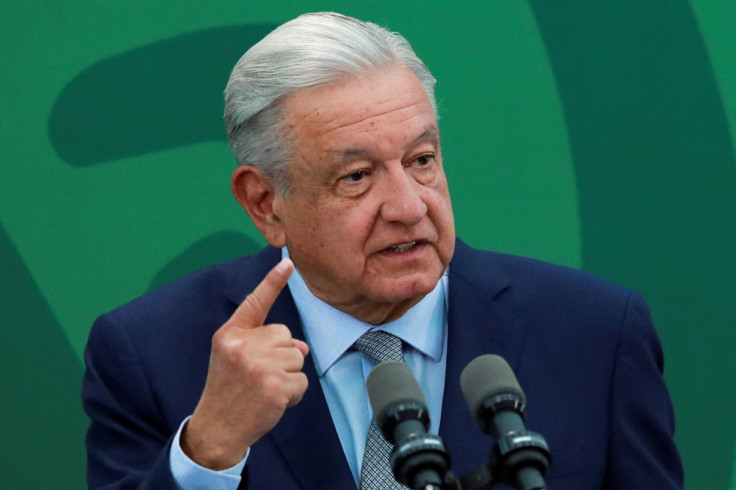
In one of his final acts as president before leaving office on September 30, Andrés Manuel López Obrador (AMLO) signed a law which effectively deepened military power in Mexico by adhering the once civilian-led National Guard to the country's Defense Ministry (SEDENA).
The former president created the Guard in 2019 as a civilian-led security force meant to avoid corruption, which was rampant in the now-defunct Federal Police force. Although he had originally said the Guard would be civilian-led, since its mobilization, its membership has been made up of members from Mexico's army, navy and former members of the Federal Police.
The new law now fully places the Guard and its 120,000 troops under the command of the Defense Ministry.
Throughout the law's long debate in Congress, the reform has raised concerns in Mexico from human rights watchdogs and opposition members, as the discretionary nature of the armed forces and the military logic that mediates the actions of its troops pose a risk to the population and human rights, they say.
Executive Director of Amnesty International in Mexico Edith Olivares Ferreto talked with The Latin Times about the potential risks faced when military forces police civilian populations.
"The military is not trained to manage and deal with civilians; they are trained to battle the enemy," she said.
"These are the agents that will be responsible for [policing] common law offenses and ordinary crimes, which puts us at serious risk, as we have already experienced in the country, where the Armed Forces have committed serious human rights violations, including arbitrary detentions, forced disappearances, excessive use of force, and extrajudicial executions," Olivares Ferreto added.
AMLO's goodbye: A return to military violence?
In 2019, López Obrador assembled the National Guard out of military troops and officers from the now-defunct Federal Police.
Through an executive order, AMLO assured that the National Guard would be of "civilian character" and pledged that its military elements would be removed within five years, giving the body time to recruit civilians for its operations.
His plan came as a relief to many Mexicans who had suffered through bloody violence during ex-President Felipe Calderón's failed "War on Drugs," where military troops were first deployed for public security.
Calderón's military strategy was a humanitarian disaster, and not only did it fail to curb the increasing power of drug cartels in the country, but it exacerbated violence, murders, disappearances, and human rights abuses at the hands of soldiers.
The war resulted in 250,000 deaths and over 60,000 disappearances from 2006 to 2020, and by 2018, the Inter-American Court of Human Rights concluded that the Mexican State was responsible for the humanitarian crisis unleashed in the country, pointing to the deployment of military troops for peacekeeping tasks as a main driver.
"The ruling of the Inter-American Court clearly states that citizen security must be in the hands of civilian bodies and that when States need to use the Armed Forces for public security tasks, they must do so in an extraordinary manner, in a temporary subordinate area, with civilian bodies," Olivares Ferreto said.
Upon López Obrador's exit from public office on September 30, it has become even clearer that he never intended to create a civilian-led National Guard. By adhering the Guard to the military, the former president has ensured that responsibility for civilian security is fully under to military control.
"The main problem is that we will not have a civilian body because the National Guard, attached to SEDENA as another armed force, ceases to be a civilian agency. This simply violates all Mexico's international obligations," the official added.
Rights groups argue that the militarization of the Guard could have troubling consequences. For instance, unlike civilian police agencies, military police are not required to register the people they detain, and members of the military accused of crimes are tried in military, not civilian courts. Moreover, the reform establishes that the National Guard can take part in police inquiries and criminal investigations, subjecting civilian law to military operations and strategies.
"This puts us at a severe risk of forced disappearance," Olivares Ferreto said. "We know that in Mexico, the period between when a person is detained and when they are placed at the disposal of an authority is when the greatest risk of disappearance by State agents occurs."
116,000 people have disappeared in Mexico since the 1960s. Nearly half of those disappeared in the six years that AMLO was in office, according to journalist collective A Donde Van Los Desaparecidos.
Even before the Guard fell under the complete control of the Defense Ministry, there were complaints made related to abuse of power.
Amnesty International reported that in 2020, a year after its mobilization, the National Human Rights Commission (NHRC) received 350 complaints related to the National Guard. In 2021, the number of complaints increased to 504, and in 2022, 577 complaints were filed.
In its five years of existence, the NHRC has received complaints related to the National Guard for abuses including arbitrary detention, sexual abuse, torture, and extrajudicial killing. Rights groups say that this will only get worse as the Guard falls under military command.
"The risks that this implies for the daily lives of all the people who live in this country, who move through this country—over 120 million people—will be subjected to a military body," said Ferreto.
© 2024 Latin Times. All rights reserved. Do not reproduce without permission.









